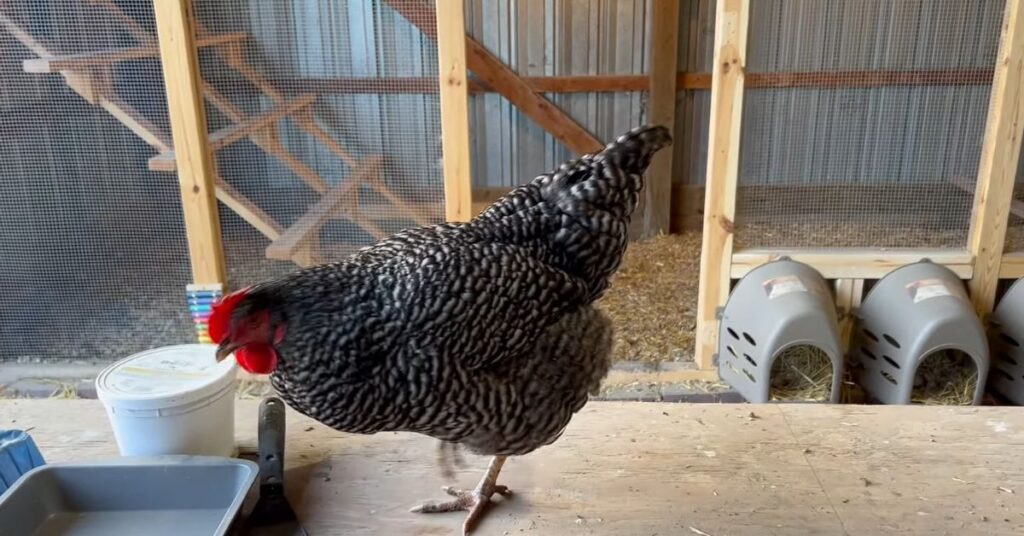As a first-time chicken owner, I was unprepared for just how noisy chickens can be. I naively thought that only roosters made noise with their loud crowing. However, I quickly learned that hens can get quite noisy as well, especially in the mornings when they are ready to be let out of the coop.
After dealing with some unhappy neighbors and trying many different things to reduce the noise from my flock, I’ve discovered several effective techniques to keep backyard chickens quieter.
In this comprehensive guide, I’ll share everything I’ve learned about minimizing chicken noise so you and your neighbors can live in harmony.
Why Are Chickens So Noisey?
Before we dive into solutions, let’s first understand why chickens make so much noise in the first place.
There are a few main reasons chickens vocalize:
Communication
Chickens have a whole range of vocalizations to communicate different messages. Their various clucks, squawks and cackles convey information to the other chickens in the flock. It’s how they establish the pecking order, warn of danger, signal food and water sources, and more.
Boredom
When chickens don’t have adequate space or opportunities to engage in natural chicken behaviors like scratching, pecking, dust bathing and foraging, they can get bored. Bored chickens tend to get unnecessarily noisy.
Stress
Loud noises, changes in environment or routine, harassment from predators, overcrowding, illness and discomfort can all cause stress in chickens. Stressed chickens will become louder as they vocalize their discomfort.
Egg laying
Many hens become especially vocal right before and after laying an egg, announcing their accomplishment to the flock. This is sometimes called the “egg song”.
Roosters crowing
While hens vocalize throughout the day, roosters are especially known for their loud, early morning crowing. Their crow is a territorial call announcing to the flock and warning other roosters to stay away.
Now that we know why chickens are prone to noisiness, let’s look at some solutions.
1. Choose Quieter Chicken Breeds
While all chickens will make some noise, certain breeds are known to be quieter than others. Here are some of the most softly-spoken chicken breeds:
- Plymouth Rocks
- Orpingtons
- Cochins
- Brahmas
- Wyandottes
- Silkies
- Easter Eggers
- Australorps
- Barred Rock
In particular, focus on docile, calm temperament when selecting breeds. Nervous, flighty chickens tend to be noisier.
You’ll still get some clucking and cooing from these breeds, but they shouldn’t be loud enough to disturb your neighbors.
Of course, individual personalities make a difference too. You may end up with a chatty hen or rooster even among the quieter breeds. Be prepared to re-home persistently noisy chickens.

2. Avoid Roosters
If you want to minimize noise, do not keep roosters in your flock. As mentioned earlier, rooster’s crowing is inherently noisy and disruptive, especially in the early morning hours.
Many urban and suburban municipalities prohibit roosters for this reason. The loud, repetitive crowing carries quite far and is impossible to stifle.
Even if your area allows roosters, it’s best to stick to hens-only if your goal is a quiet flock.
3. Get the Right Number of Chickens
When chickens don’t have adequate space, they become stressed and nosier. Overcrowding leads to more squabbling and distress vocalizations.
Here are some guidelines on flock size for your space:
- Coop: Minimum 2-3 square feet of floor space per hen inside the coop
- Run: Minimum of 8-10 square feet per hen if they are confined to a run
- Free range: Maximum of 10 hens per acre for free-ranging
Start with just 3-5 hens, and only add more if you have sufficient room. Remember to account for future growth when planning space requirements.
4. Provide Plenty of Resources
Chickens will get noisy when they’re bored, overheated, hungry or thirsty. Prevent nuisance noise by ensuring your chickens have everything they need:
- Food – Full feeders with layer feed appropriate for their age
- Water – Full, clean water. Provide multiple water sources.
- Space – Adequate space in coop and run as outlined earlier
- Cover – Access to shade, roosts, and places to hide
- Enrichment – Perches, dust baths, vegetation and loose substrate for foraging
- Nest boxes – One box for every 4-5 hens
- Cooling – Access to cooler areas + misters on hot days
- Bedding – Deep, dry bedding in coop
- Predator protection – Secure, predator-proof coop and run
When chickens have their basic needs met, they have less reason to vocalize. Provide the proper resources and care for content, quieter chickens.
5. Entertain Your Chickens
Bored chickens will make more noise. Keep them occupied with foraging and pecking opportunities.
Scatter treats and greens in their run so they have something to hunt and peck for. Hang cabbage, lettuce, apple slices or even mashes inside the run for them to jump and reach for.
Add chicken swings, perches at different heights and hide treats in cardboard tubes or boxes so they have to work for their food. The more you keep them engaged, the less time they’ll have to squawk out of boredom.

6. Let Them Free Range
Chickens that are cooped up all day will be louder than chickens that get to roam and forage freely.
If possible, allow your chickens to free range for at least part of the day (while supervised).
As they scratch, peck, dust bathe and explore the yard, they’ll be occupied with natural chicken behaviors instead of vocalizing from boredom or confinement.
Just be sure your yard is secure from predators beforehand. Chickens allowed to free range need places to hide or run for cover.
7. Position the Coop Carefully
Where you place the coop in relation to property boundaries can make a difference in how much noise neighbors hear.
Ideally, position the coop as far from other houses and shared fences as possible. Face the coop door away from neighboring homes.
If feasible, situate the coop so that structures help block sound. For example, place it behind a storage shed or under dense bushes.
Burying the coop into a hillside can also help prevent sound from carrying.

8. Use Sound Absorbing Materials
If the coop positioning still doesn’t provide enough noise buffering, add sound-muffling materials to the coop.
Solid wood absorbs more sound than thin plywood. Line the walls with dense panels like MDF or plywood. Seal any gaps or openings.
Insulate the walls and ceiling with sound-dampening materials like Rockwool or Roxul insulation. Avoid fiberglass which is less effective at absorbing noise.
Also install solid doors, double paned windows, and hang acoustic damping mats or panels made from absorptive materials.
The more you can insulate the coop, the less noise will emanate to disturb neighbors.
9. Add a Coop Radio
This trick sounds a little odd, but many chicken owners report success with putting a radio inside the chicken coop.
Tune it to a classical, jazz or easy-listening station. The calming, predictable sounds help soothe the chickens. It masks sudden noises that could startle them into loud vocalizations.
You can even connect it to a timer to turn on and off during key times, like early morning when chickens are anxious to get out of the coop.
No one knows exactly why it works, but it seems to relax both chickens and their human coop-mates!
10. Use a Coop Fan or White Noise Machine
Like the radio, a fan or white noise machine inside the coop can help drown out noises from outside that may rile up the chickens.
The constant, predictable hum calms the chickens and covers sudden sounds. Place it away from roosts to avoid too strong of a draft.
If using a white noise machine, avoid shrill artificial sounds. Opt for calming sounds like rainfall, ocean waves or ambient music.
11. Discourage Eggs Songs
As mentioned earlier, hens often loudly vocalize just before and after laying an egg as a way to announce their accomplishment.
While you can’t eliminate this natural behavior entirely, you can discourage excessive eggs songs:
- Provide multiple private nest boxes so hens don’t have to compete over space
- Use nest box curtains to reduce “showing off”
- Avoid going into the coop right after a hen lays an egg (doing so often triggers more singing as you have validated her announcement)
- Gently discourage hens that linger in the boxes singing by shuffling them along
With these tips, you may be able to reduce the frequency and intensity of disruptive egg singing.
12. Install a Coop Door Opener
Letting the chickens out first thing in the morning is key to keeping noise down. Chickens are most vocal when eager to get out and start their day.
However, not everyone wants to trudge out to the coop at the crack of dawn. This is where an automatic coop door opener comes in handy.
These devices can be set to open at a designated time each morning. Sunrise-sensing options open the door when natural light is detected.
That way, you don’t have to wake up early, but the chickens can still be let out in a timely manner before they start raising a ruckus.
13. Use a Coop Timer
Another handy tool is a coop timer that controls the lighting inside the coop. Chickens start stirring when light is detected in the morning.
By keeping the coop dark, you can delay when chickens begin their noisy efforts to be let out. Set the timer so interior lights don’t come on until your designated wake-up time.
Just be sure the coop still gets 15-17 hours of total light including daylight. Too little light will negatively impact egg production. But a small delay can preserve precious sleep.
14. Manage Light Quality
Light color may also influence chicken vocalizations. Some owners report success using red LED bulbs in the coop at night instead of standard white lighting.
The red light spectrum allows chickens to see while still feeling it’s “night-time”. This leads to quieter activity in the coop at night.
You can also try portable LED light wands that let you easily change color as needed at different times of day. More research is needed, but light quality may be a useful noise reduction tool.
15. Train Chickens with Treats
With regular positive reinforcement training, you can teach chickens to modify their vocal behaviors for treats.
Use an audible cue like a whistle or word to indicate you have a treat. Give the treat when they respond quietly without squawking.
Over time, use the cue when they get loud as a signal to shush in exchange for a treat. Consistency is key – you may be able to train chickens not to react noisily to certain triggers.
16. Use Separators
For smaller coops, hanging nest boxes or run dividers can help cut down on squabbles over space. Giving each hen her own niche reduces competition over resources that lead to noisy conflicts.
You can also separate dominant hens that tend to pick fights with others and stir up a commotion in the process. Housing them individually for parts of the day may promote overall flock calm and quiet.
17. Add Landscaping Features
If possible, take advantage of landscaping features that can muffle or absorb chicken chatter:
- Install a dense hedge or evergreen screen to absorb sound. Cedar and arborvitae work well.
- Position the coop behind a small hill to block and redirect noise
- Build a sturdy fence taller than the coop to disrupt noise path – it doesn’t have to completely enclose the run, even a partial fence/wall can help
- Stack hay bales around the run perimeter
- Plant bamboo or tall grasses around the coop – the foliage disrupts the noise path
While landscaping alone won’t soundproof your coop, it can complement other noise-reduction efforts. Every bit of disruption helps reduce what neighbors hear.

18. Occupy Noisy Chickens
If you have particularly loud or vocal chickens that love to squawk, give them extra enrichment activities to redirect their energy.
Place noisy chickens in a separate pen or enclosure and provide pecking blocks, cabbage heads, treat balls, dust bathing spots and other engaging elements so they have an outlet for chatter.
Rotating all chickens through the activity station can help prevent boredom and frustration in the whole flock.
19. Discourage Predators
Chicken’s warning cries and alarm calls are unavoidable if they spot a potential predator. However, you can be proactive about deterring common predators like hawks, raccoons and loose dogs.
This will prevent chickens from feeling threatened in the first place and sounding the alarm.
- Make sure the run is fully enclosed with wire sunk into the soil, roofed, and with small mesh openings. Lock the coop securely at night.
- Use predator-proof electric fencing if needed.
- Trim back tree branches and dense vegetation around the run so there are no places for predators to hide and stalk.
- Install motion-activated lighting, sprinklers and noise deterrents.
- Use hawk kites, balloons with predator eyes, and other deterrents.
The more secure your flock feels, the less reason chickens have to panic and vocalize.
20. Rule out Stressors
Loud vocalizations can signal something is wrong with a chicken. Before trying to simply quiet them, make sure their basic needs are met and they aren’t distressed.
Monitor for signs of illness, injury, parasitic infection, malnutrition, inadequate housing and other issues. Address any underlying problems to resolve the root cause of noisy alarm calls.
Stressed chickens will be louder in an effort to communicate their needs. Your first step should always be ensuring proper care and a stable environment before silencing their sounds.
21. Alter Feed Composition
Some research indicates that diet can impact chicken vocalizations. Certain feed ingredients may encourage calling and crowing.
According to Texas A&M studies, limiting methionine, an essential amino acid, reduces mating calls in roosters. Corn and wheat have less methionine than soy.
Anecdotally, some owners report less vocal chickens when supplementing feed with chamomile, oats or magnesium.
Adjusting protein, carbohydrate and mineral content may help, but more studies are needed to draw firm conclusions. Only make small changes gradually to avoid malnutrition.
22. Use the Right Bedding
Chickens will get noisier at night if they are uncomfortable. Make sure coop bedding is:
- Deep enough to cushion their feet – 4+ inches
- Fluffy and loose so they can burrow in
- Moisture absorbing
- Free of irritating dust and molds
Good options are wood shavings, straw, hemp bedding or sand. Avoid very dusty, damp, matted or sparse bedding. Proper bedding keeps chickens settled at night.
23. Discourage Broody Hens
A broody hen is one who wants to hatch eggs. She’ll sit on a nest for prolonged periods, only getting up once a day.
Broody hens growl, screech and peck when disturbed. They can get quite noisy defending their territory and eggs.
To curb this:
- Collect eggs often so they aren’t left to stimulate broodiness
- Make nest boxes less appealing by lining with hardware cloth
- Block access to preferred nests to break the brooding obsession
- Gently remove broody hens daily, even multiple times a day
- Use wire bottom coops that discourage sitting for long periods
With persistence, you can break broody behavior and restore peace and quiet. But some breeds are prone to high broodiness that’s harder to detour.
24. Add a Coop Fan
As mentioned earlier, a fan in the coop provides calming white noise that can help soothe restless chickens.
Point the fan away from roosts to avoid a direct draft. Mount it up high for best noise distribution. An oscillating fan works best to spread the soothing hum.
Use a fan rated for outdoor/wet locations. And make sure it is mounted securely and has a guard for safety around curious chickens.
25. Use a Nightlight
Chickens can get spooked in total darkness, reacting noisily to strange night noises. A low-level nightlight helps them see without disrupting sleep cycles.
Choose an LED bulb or lamp in a warmer hue like red or orange. Blue spectrum light keeps chickens awake.
Place it away from food and water to prevent soiling. Mount out of reach of flapping wings for safety.
A steady, subtle nightlight helps reassure chickens so they stay calm and quiet through the night.
26. Apply Beak Tape
If you have a persistently noisy hen, you can temporarily mute her by applying vet wrap tape around her beak. This impedes her ability to open the beak fully to make loud vocalizations.
Only use special durable, breathable tapes made for poultry. Wrap the tape completely around the beak loosely so the chicken can still eat, drink and breathe.
This technique should only be used as an absolute last resort on problem chickens. And only leave the tape on for a few days before removing.
Be sure to monitor the hen closely while taped to ensure she is still able to eat, preen and behave normally. Extended use of beak tape risks malnourishment and damage to the beak tissue.
Use this method cautiously and sparingly if other techniques fail. And never fully trim or alter the beak, which is inhumane and permanently disabling.
27. Relocate the Noisiest Chickens
If you have one or two especially noisy chickens that are inciting others, you may need to re-home them. They likely won’t adjust their vocal tendencies to suit your suburban setting.
First try separating them in their own enclosure to see if getting them away from the flock helps. Some hens are just disruptive to the overall group dynamic.
But if their noisiness persists, find them a new home better suited to their vocal talents! The rest of your flock will likely be calmer and quieter without their clamoring influence.
28. Get a Rooster Collar
If you decide to keep a rooster, a rooster collar is a must for muffling his crowing. Made of durable outdoor fabric, the collar fits around the rooster’s neck.
It is not restrictive, just prevents him from fully extending his neck to amplify crowing. This directs the sound into the plume of neck feathers to silence crowing by 75% or more.
A rooster collar is more effective and comfortable than other attempts to quiet roosters, like de-vocalization. But he’ll still make some noise, just at a much lower volume.
29. Consider Noise-Monitoring Technology
New technology allows you to monitor noise levels from your coop and receive alerts when sound exceeds designated thresholds.
Devices like Coop Control attach a decibel reader to your coop that sends real time noise data to your mobile phone. This allows you to identify peak chatter times and causes.
You can even connect noise-monitoring systems to automatic coop doors to open them when loudness hits a certain decibel level in the morning.
While pricey, for serious noise control these systems let you respond to rising commotion quickly. The key is being aware of noise levels so you can take action to manage it.
30. Communicate with Neighbors
If chickens get noisy at times, being open and honest with your neighbors goes a long way.
Make sure neighbors have your number to text if the chickens are particularly loud one morning. Share your plans to reduce noise, and let them know they can provide feedback on what helps or doesn’t help.
Offer apologies if your chickens are disruptive, along with a dozen fresh eggs and assurances you are taking steps to keep them quiet! A little good neighbor diplomacy makes coexistence much smoother.
Conclusion
I hope these comprehensive tips help you keep your backyard flock quiet enough to avoid ruffling neighborhood feathers!
Controlling chicken chattiness takes some trial and error to find the best solutions for your individual flock. Be patient in implementing different methods.
The key is being proactive by selecting more docile breeds, providing adequate space and enrichment, managing their environment, and promptly addressing excessive loudness when it occurs. With commitment to ongoing training and care, you can enjoy a pleasantly peaceful flock.
Let me know in the comments if you have any other proven tricks for reducing chicken noise! And don’t forget to share this guide with fellow backyard chicken keepers seeking a harmonious middle ground.
References:
